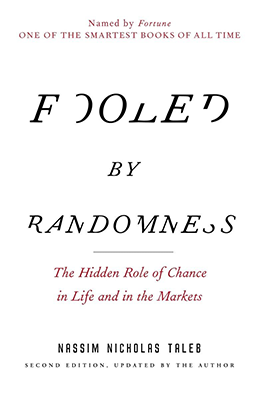Fooled By Randomness
“Fooled by Randomness: The Hidden Role of Chance in Life and in the Markets” by Nassim Nicholas Taleb is a book that explores the role of randomness and luck in human affairs, particularly in the context of financial markets. Here’s a summary of its key points:
- The Illusion of Control: Taleb challenges the notion that we have more control over outcomes than we actually do. He argues that humans tend to overestimate their ability to predict and control events, leading to overconfidence and irrational decision-making.
- The Role of Luck: The book explores the importance of luck in determining success and failure, both in life and in the financial markets. Taleb emphasizes that many outcomes are the result of random chance rather than skill or merit, and that we often fail to recognize the role of luck in our own achievements.
- Survivorship Bias: Taleb discusses the phenomenon of survivorship bias, where we focus on successful outcomes while ignoring the failures that are hidden from view. He explains how survivorship bias can distort our perception of risk and lead to faulty decision-making.
- Black Swans: Taleb introduces the concept of “black swans”—rare and unpredictable events that have a major impact on society and the economy. He argues that these events are often overlooked or underestimated by traditional risk models, leading to catastrophic consequences when they occur.
- The Monte Carlo Fallacy: The book explores the fallacy of assuming that past events can predict future outcomes, known as the Monte Carlo fallacy. Taleb argues that this belief is flawed because it fails to account for the role of randomness and uncertainty in shaping future events.
- Antifragility: Taleb introduces the concept of “antifragility”—the idea that some systems actually benefit from volatility, randomness, and uncertainty. He argues that by embracing uncertainty and adapting to change, individuals and organizations can become more resilient and successful over time.
- Practical Implications: The book concludes with practical implications for navigating a world characterized by randomness and uncertainty. Taleb discusses strategies for managing risk, building resilience, and embracing uncertainty in both personal and professional life.
Overall, “Fooled by Randomness” offers a thought-provoking exploration of the role of randomness in human affairs and the limitations of our ability to predict and control outcomes. Whether you’re a professional investor, business leader, or simply interested in understanding the complexities of the world, Taleb’s insights can help you become more aware of the role of luck and uncertainty in shaping our lives.

